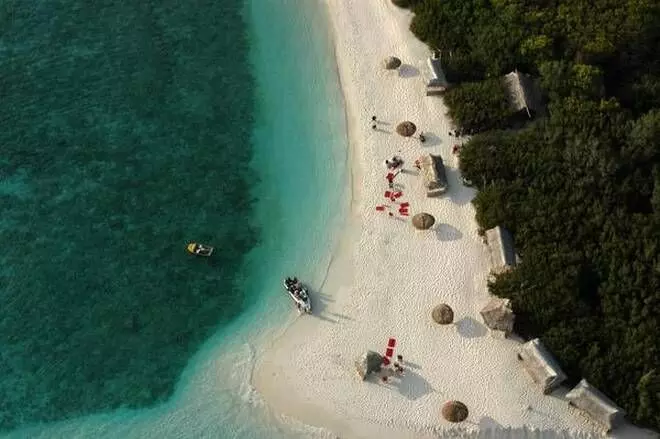
Reforms: The business eye on Lakshadweep's fragile ecology
text_fieldsThe Indian government's interest in the Lakshadweep chain of islands has now extended to proposing extensive development in what is some of the most ecologically diverse and sensitive areas in India.
The focus on Lakshadweep as a tourist destination follows the recent controversy over Lakshadweep's new administrator Praful Khoda Patel who was recently accused of implementing "draconian" measures to acquire land for development and silence the population through arrests under the Goonda Act.
In January of 2021, the Indian government had set its sights on 10 of the beautiful chain of islands as a prime spot for holistic development by promoting tourism and offering facilities for the export of seafood and coconut-based products at the sixth meeting of the Island Development Agency (IDA), chaired by Union Home Minister Amit Shah.
The multi-crore project to turn Lakshadweep into another Maldives has been proposed by NITI Aayog and the Ministry of Home Affairs and includes ambitious plans for water villas and carbon-neutral tourist facilities.
With an initial investment of ₹266 crore (and additional investments of up to ₹788 crores expected from the private sector), the project will be implemented by Lakshadweep's Society for Promotion of Nature Tourism and Sports (SPORTS).
The Andaman and Nicobar Islands were also put on the list, with 16 islands earmarked for tourist development, including submarine fibre optic cable connections planned between Port Blair and 6 other islands to promote technological connectivity for private enterprises and MSMEs.
Although Shah emphasised the need to preserve the ecology of the islands, as well as promote sustainable development, 114 scientists from more than 30 universities and research institutes urged the Lakshadweep administration to reconsider the project in a petition.
Human activity, such as construction, is bound to impact the lagoon's corals too, says Kelkar, a doctoral student of aquatic ecology at the Ashoka Trust for Research in Ecology and Environment according to a report in The Indian Express. Other concerns include the impact of development on the extensive "lagoon grasses" which help prevent beach erosion as well as Lakshadweep's extensive coral reefs which act as nursery and food source for many species.
Rohan Arthur is a marine biologist with the Nature Conservation Foundation-India and has been studying Lakshadweep's reefs and seagrasses for more than 20 years. He, and the several others who framed the petition, describe these lagoons as the islands' 'insurance sites'. The shallow lagoons are protected from the open sea by an outer coral reef; this reduces the impact of wave action, preventing beach erosion and protecting the islands' limited freshwater supply.
Arthur went on to say that planners have pegged water consumption by tourists and locals at 170 litres/day. "The real numbers are higher. Locals use between 180-200 litres a day. A high-end resort might need as much as 600-700 a day."
Locals fear that they will not be able to use the beaches or lagoons for their traditional livelihoods. "We catch bait fish — two or three-inch fish — for our pole-and-line tuna fishery from the lagoons," says Mohammad (real name withheld on request), who lives in Kadmat. "I fear that the floating solar panels [to power villas] could restrict our access to the lagoon and affect the fishing," he was quoted as saying to the Indian Express.
Arthur also worries that coral reefs, already stressed by ocean acidification due to climate change, will respond poorly if their source of light is blocked by solar panels built for resorts.
Given this backdrop, the keystone Bill is the draft Lakshadweep Development Authority Regulation, 2021 (LDAR) which locals have been protesting as both undemocratic and "draconian".
Section 29 of the LDAR states that any land required for the Development Plan shall be deemed to be land needed for a public purpose. Section 33 and Section 35 further provide that islanders wishing to develop land selected for development must seek permission from the Planning and Development Authority, which can either accept or reject such request at its absolute will.
The overarching powers of the proposed regulation as well as the intensified effort to introduce tourism and development into ecologically sensitive areas already battling climate change have evoked much alarm amongst the locals, although they fear retribution for speaking out. Natives have already claimed that the islanders have been targeted and arrested for their protests against the CAA/NRC bills as well as the fact that the region is dominated by Muslims.
The islander's scepticism of proposed development activities is compounded by the fact that NITI Ayog's push for tourism has not found many takers even amongst private bidders, due to the cost of maintaining and building such structures on the small islands.
Everything will have to be shipped in from the mainland. That will drive up costs. For freshwater supplies, resorts will need their own desalination plants. The ones already set up in Lakshadweep for the local community cost up to 11 crores, said an anonymous scientist at the National Institute of Ocean Technology, quoted by the Wire.
As Indians from the mainland have begun pushing for a rollback of such development measures, it remains to be seen whether the Indian government will heed the call.






















